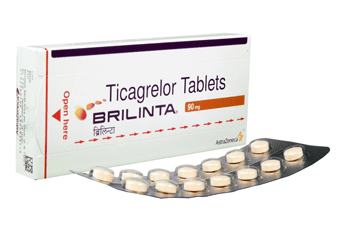Brilinta (Ticagrelor)
Brilinta (Ticagrelor) belongs to a group of medicines called blood thinners. This medicine is used to reduce the formation of blood clots and lowers the risk of heart attack, stroke, and death in people with heart disease. Before starting the treatment, tell your doctor about all your medical conditions, especially if you have liver, heart, or bleeding problems. It is important to know that Brilinta can cause significant or fatal bleeding. If you have excessive and prolonged bleeding, contact your doctor straight away. Also, inform your doctor about all of the medicines you take.
Order Brilinta at low prices from our online Pharmacy.

*Product image is for reference only
Brand Choices

 Prescription Required
Prescription Required
 Shipped from Mauritus
Shipped from Mauritus
 Prescription Required
Prescription Required

 Prescription Required
Prescription Required

 Prescription Required
Prescription Required

 Prescription Required
Prescription Required
 Shipped from Mauritus
Shipped from Mauritus
 Prescription Required
Prescription Required

 Prescription Required
Prescription Required
Generic Alternatives

 Prescription Required
Prescription Required

 Prescription Required
Prescription Required

 Prescription Required
Prescription Required
Brand Choices

 Prescription Required
Prescription Required

 Prescription Required
Prescription Required

 Prescription Required
Prescription Required
Generic Alternatives

 Prescription Required
Prescription Required
Brand Choices

 Prescription Required
Prescription Required

 Prescription Required
Prescription Required

 Prescription Required
Prescription Required

 Prescription Required
Prescription Required
Generic Alternatives

 Prescription Required
Prescription Required

 Prescription Required
Prescription Required
FREQUENTLY ASKED QUESTIONS (FAQs):
What is Brilinta?
Brilinta (Ticagrelor) is a prescription oral medication and belongs to a group of medicines that prevent blood clots called antiplatelets. Brilinta reduces the risk of a heart attack or stroke in people with heart disease. It works by preventing the blood platelets from clumping together and forming harmful clots. However, the safety and efficacy of the drug are not known in children.
Uses and Benefits of Brilinta:
Brilinta is prescribed by doctors to reduce the risk of heart attack, and stroke in patients with the following conditions:
-
Coronary Artery Disease (CAD) where the blood supply to the heart is reduced due to the blockage in the arteries.
-
Acute Coronary Syndrome (ACS)
-
A history of a heart attack, an acute ischemic stroke, and a mini-stroke or transient ischemic attack.
Brilinta is also used to prevent blood clots in people who received stents for Coronary heart disease.
Side Effects of Brilinta:
Patients taking Brilinta may experience some common side effects, including headache, nausea, dizziness, and nosebleeds. These side effects may fade away after some time.
Brilinta may also cause serious side effects including:
-
Shortness of breath
-
Easy bruising and bleeding
-
Severe or uncontrolled bleeding
-
Blood in the stools
-
Vomiting blood
-
Pink, red or brown urine.
-
Confusion and trouble speaking
-
Vision changes
-
Signs of a blood clotting
-
Rash, itching, and swelling of the face, tongue, and throat
Talk to your doctor right away if you notice any serious side effects after taking Brilinta.
How to use Brilinta?
Brilinta is available in the form of tablets and taken orally with or without food, usually twice daily. If you are not able to swallow Brilinta, you may crush the tablet and mix it with water. Drink the mixture right away.
Take Brilinta at the same time every day for maximum benefit. If you forget to take Brilinta, take your next dose at the scheduled time. It is always advised to not take two doses at the same time.
Brilinta is usually taken along with aspirin. Your doctor may prescribe a 75-100 mg aspirin tablet daily. Do not take more than 100 mg aspirin daily because it can affect the efficiency of Brilinta. Tell your doctor if you are already taking medicines that contain aspirin.
Take Brilinta and aspirin exactly as recommended by your doctor. Do not stop taking the medications without asking your doctor.
Drug Interactions:
Some medications may interact with Brilinta and affect its working or increase the risk of bleeding. So, before starting the treatment tell your doctor about all the medications you are taking, especially
- Other antiplatelet drugs such as clopidogrel
- NSAIDs such as ibuprofen
- Blood thinners such as warfarin
- Mifepristone
- Antibiotics and Antifungals
- HIV and Hepatitis medications
- Antiseizure medications such as carbamazepine
- Medications for heart diseases or blood pressure
Safety Information:
-
Do not take Brilinta if you have any bleeding problems, a history of bleeding in the brain, or are allergic to any of the drug ingredients.
-
Before using Brilinta, tell your doctor if you have had bleeding problems such as hemophilia or nosebleeds, stomach ulcer, recent injury or surgery, liver disease, lungs problems like COPD or asthma, and heart rhythm problems
-
If you plan to have surgery or dental procedure tell your doctor you are taking Brilinta as it can increase the risk of bleeding. Your doctor may advise you to stop taking Brilinta 5 days before surgery.
-
Talk to your doctor about the safety of Brilinta if you are pregnant, plan to become pregnant, or breastfeeding.
Brilinta Cost:
Brilinta, a widely prescribed antiplatelet medication, plays a crucial role in preventing heart attacks and strokes. In the USA, the cost of Brilinta varies based on factors such as dosage and location. On average, a 90-day supply can range from $250 to $380 without insurance. To alleviate costs, many individuals explore options to buy Brilinta online from LifeRx Pharmacy.
Opting to buy Brilinta online in Pennsylvania and other US cities provides a convenient avenue for managing cardiovascular health. The Brilinta cost in Pennsylvania can vary based on dosage and the chosen online pharmacy.
The Brilinta cost in Florida and other parts of the USA can vary based on dosage and pharmacy selection. Online purchase of Brilinta from LifeRx Pharmacy ensures accessibility and offers the potential for cost savings through digital discounts.
Buy Brilinta online:
Brilinta helps to enhance blood flow to the heart and lowers the risk of developing cardiovascular problems. The Brilinta price for a usual dose of 30-day supply ranges from $450 to $500 when purchased from a retail store. This Brilinta cost can vary based on factors such as the product's origin country, dosage strength, and the specific pharmacy.
One can buy Brilinta online from LifeRx Pharmacy, our trustworthy and reliable online pharmacy platform. It offers a competitive Brilinta price as compared to local pharmacies or other online platforms. Our reputable online pharmacy provides a convenient solution for purchasing prescription drugs without the need to visit a physical store.
Can you take Brilinta and Aspirin at the same time?
In certain cases and according to a doctor's prescription, Aspirin and Brilinta can be taken together. For people who have experienced a heart attack, unstable angina, or specific cardiac procedures such as stent implantation, Brilinta, and Aspirin are frequently administered combined. Nevertheless, there is a chance of bleeding if you take both drugs at the same time. Your physician will evaluate each of your unique risk factors and compare them to the possible advantages of receiving dual therapy.
What cold medicine can I take with Brilinta?
Decongestants that alleviate nasal congestion, such as phenylephrine or pseudoephedrine (Sudafed), are frequently included in cold treatments and can be used safely with Brilinta. Brilinta is typically safe to use with cough suppressants, such as dextromethorphan, which is used to treat allergy or cold and flu-type symptoms.
Is it dangerous to miss a dose of Brilinta?
If you are taking Brilinta (Ticagrelor) to prevent blood clots following a recent heart-related procedure or incident, missing a dosage may raise your chance of experiencing a cardiovascular event such as a heart attack or stroke. Brilinta must take it exactly as directed by your doctor. If you miss the dose by chance take the missed dose as soon as you remember Unless it is almost time for your next scheduled dose.
Does Brilinta cause hair loss?
Hair loss is reported as an uncommon adverse effect of Ticagrelor, or Brilinta. However, if you encounter any strange or severe side effects of hair loss while taking Brilinta seek advice from your healthcare professional.
Is there a generic drug for Brilinta?
Indeed, a generic Brilinta is available. The generic medications contain the same active components with the same potency and dose form, as available in brand medication but are usually less costly. Whereas the brand medication offers a high price for the medication, generic medication can be easily accessible at a much-reduced price. One can buy brand or Generic Brilinta online from our LifeRx Pharmacy.











